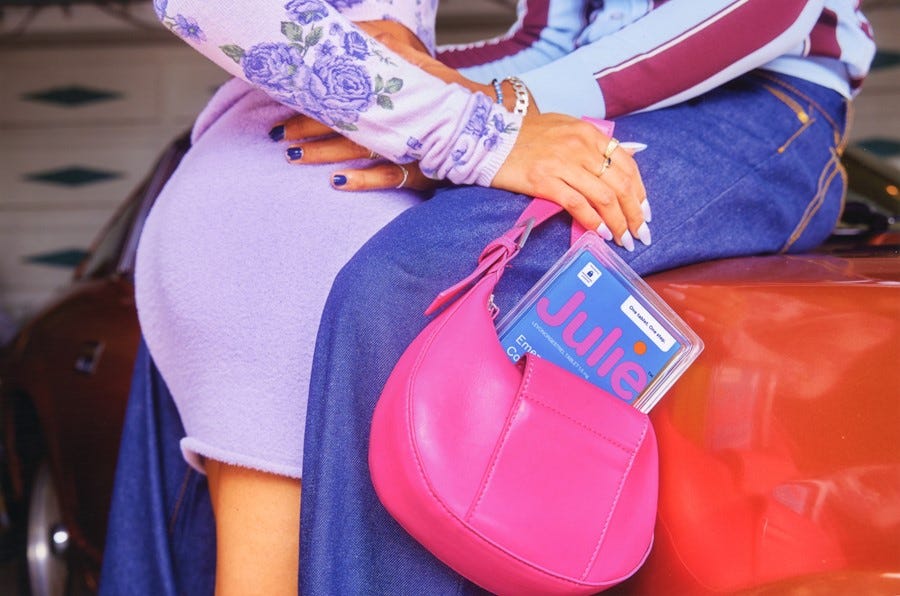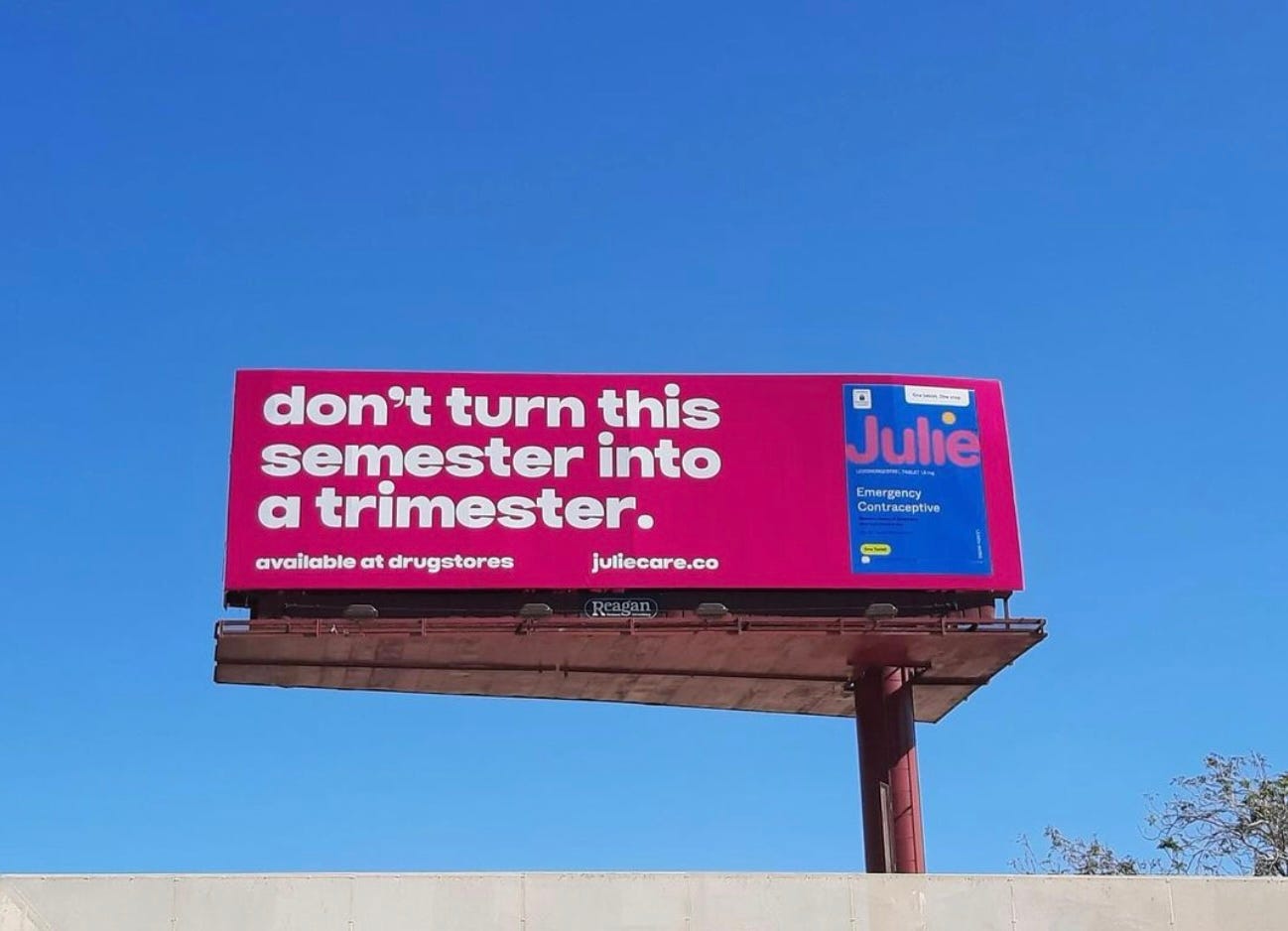- The Case for Brand
- Posts
- How Gen-Z brand Julie rebranded the morning after pill and became the nation's largest donor of emergency contraceptives
How Gen-Z brand Julie rebranded the morning after pill and became the nation's largest donor of emergency contraceptives
Tackling stigma, one TikTok at a time

Julie are a two year old emergency contraceptive pill brand that use humor, a deep understanding of their audience and a one-for-one donation program to challenge perceptions of the morning after pill
Who will love this
People who love a brand that mixes it up with culture
One-for-one brand stans (I see you, Warby Parker heads)
Pharma execs who are bored of soulless pharma brands
Anyone who’s ever felt a little niggle of shame buying an emergency contraceptive pill

Today
G’day from a very rainy Seattle!
We’re three weeks out from the U.S. presidential election and reproductive rights are on my mind. 🗳️PSA: If you’re a U.S. citizen, make sure you’re registered to vote. 🗳️
Today’s brand is Julie, a progestin-only emergency contraceptive that helps prevent pregnancy by temporarily delaying or stopping ovulation. It’s not a form of birth control nor an abortion pill – instead, it helps the body stop a pregnancy before it starts.
Julie was founded by Julie Schott, the woman behind Starface pimple patches and Blip nicotine gum. Schott has made big business out of repackaging stigma and reaching Gen Z with bright packaging and fresh perspectives.
Since Julie launched in September 2022, they have:
Been covered in the Wall Street Journal, FastCompany, and Elle
Worked with over 300 partner organizations across 50 states
Become the nation’s largest donor of emergency contraception
To me, this is a pitch perfect example of modern brand building.
Let’s dig in. ✌️
— Amanda
How Julie are building a brand to challenge cultural perceptions what an emergency contraception user looks like
I get really jazzed when brands take on big stigmas, big problems, and changes we need to see in the world. For me, Julie is one that ticks those boxes.
Julie have had the distinct advantage of launching under a well known founder in the midst of a national reproductive rights conversation in America. But the other thing I really love about Julie is that they are always building their brand. You can see that they’re taking every opportunity in culture to position themselves and get more people talking about the product.
One of the traps I see brands fall into is thinking they’re finished when their identity work is finished. But let’s be clear: brand building is a continuous process. Launching a new brand is only the beginning. I like how Jeremy Bullmore describes it:
"People build brands as birds build nests, from scraps and straws we chance upon."
@julie your honor, the streets need me #fypシ #singlelife #cvs
Business strategy
The foundation of Julie’s business is simple: selling emergency contraceptives. The problem they face? Emergency contraceptives are stigmatized. Julie exists to change that.
Brand strategy
Julie’s market is large. In the US, 48 percent of pregnancies are mistimed or unwanted, and almost half of all pregnancies globally are unintended. Julie is legal in all 50 states and can be bought without a prescription. The role for brand here is simple: destigmatize emergency contraceptives.
What I think is great about Julie: they’re really in tune with who their customer is. Simple, but important.
“In our focus group, we learned that there are many users who go to the store, and they’re afraid they’re gonna run into someone they know because they live in a small community. They might even know the person checking them out at the register. We wanted to create an experience that if you’re looking for discretion, you can get discretion with this. You may be holding this in your hand and run into your neighbour, and it’s not going to scream out what it does. Even to have it in your home, maybe you live with your parents, maybe you’re a young person, so being able to offer that is important to us.” Dazed
Julie’s brand strategy stems from a deep understanding of their customer.
There are four main themes I’d pick out from their brand strategy:
1️⃣ Re-presenting emergency contraception. Brands don’t exist in a vacuum. Smart brands understand that they exist in culture, and that they can use culture as a headwind - or for the right brands, they can even shift culture. Tough to do, but power to you if you’re in that position and you use that position for the betterment of society. From ads to voice to donation programs, the way Julie shows up in the world broadens society’s view of who uses emergency contraception.
2️⃣ Prioritizing education and discretion. Julie’s buyers want information, but also discretion. Education is a major pillar of the brand, and Julie have built their business and their brand to deliver it, from their responses to questions on social media to their website to the events they curate. From Julie’s founder:
“You’d be surprised how little information the brands who offer this drug actually provide the user in an easy-to-digest way that they can trust. We assembled a medical board for that reason, so the user can ask questions and have them answered in a timely manner. You purchase it without a prescription so you’re not having an interaction with the doctor. It’s important for us to create a safe space where all the information is available so that the user doesn’t have to do any work, they should not have to do work.”
Julie’s playing chess while other brands are playing checkers.
3️⃣ Improving access. Access is a major issue for reproductive rights, and Julie are uniquely positioned to speak about access to emergency contraception. What I love about this brand, though, is that they’re not just talking about it - they’re doing something about it by donating one pill for every pill sold, and partnering with organizations like Black Women’s Blueprint, Kentucky Justice Network and others, reaching people most affected by health disparities.

Brand marketing moves 💃
I loved looking through Julie’s marketing. It doesn’t feel like marketing - which really says something about the state of marketing, but that’s a soliloquy for another day!
The non-pharma pharma ad. This ad, written by comedian Esther Povitsky made me laugh. Two dudes in a drugstore haggling over the last Julie pill in the store for who’s least ready to be a father.
Out of home that’s worth talking about. From ‘When you’re not ready to be a mommy influencer’ to ‘don’t turn this semester into a trimester’, Julie are putting up the kind of out of home that’s worth making its way into the group chat.
Merch. Julie partnered with OGBFF to release a series of baby tees (to be clear, small cropped tees, not tees for babies).
Community marketing. Julie has partnered with a number of community organizations, colleges, and health organizations to launch a series of talks and donate emergency contraception to people who may not have access.
Impact. Julie’s impact report is a goodie. It’s not 100 pages long, it’s pretty, and it demonstrates the company’s priorities.

Help me out? I’d like to know where you prefer to read this newsletter from.
That’s all for now.
Happy Friday.
Amanda ✌️
Was this message forwarded to you? Need to make the case for brand? Sign up below 👇
Questions? Hot takes? Brands you want to see covered? Hit ↩️ reply.